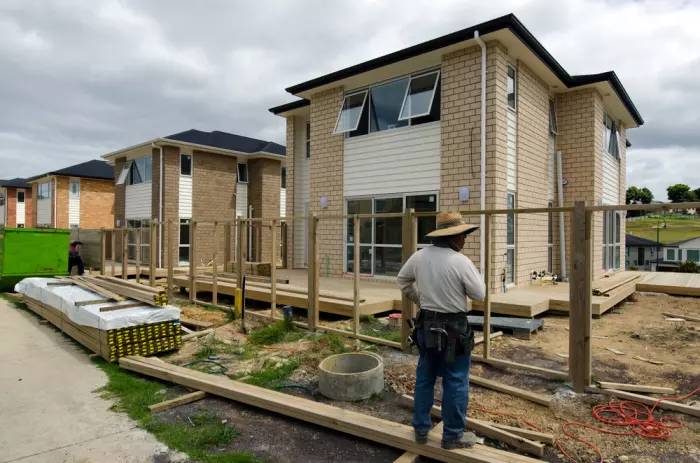Bold interventions are needed in the housing market to help stabilise or even start a gradual decline in prices, in order to avoid a painful real estate correction, ANZ Bank New Zealand said.
Comments by ANZ economist Liz Kendall and chief economist Sharon Zollner suggest the market is vulnerable to short-term "disorderly" corrections and household financial stress when interest rates rise again. This follows the bank's move yesterday requiring property investors to stump up with at least a 40 percent deposit to help balance the residential property market.
ANZ is the country’s largest mortgage lender, holding a 30.9 percent market share at Sept. 30.
In its latest property focus, the economists said NZ needed to make “meaningful change to elicit a sustained stabilisation or even gradual decline in real house prices." That needed to be supported by initiatives to boost real incomes, they said.
This is because incomes continue to lag behind house prices, which has seen affordability worsen “significantly” in recent decades, with the median house price now around seven times the average income.
But while house prices have outpaced incomes, that has been buffered by low interest rates, making household payments more manageable.
Kelvin Davidson, senior property economist with Corelogic estimates typical servicing rates for mortgages are today at about 31 percent of household income versus the long-term average of closer to 36 percent, “though it is taking longer to raise the deposit, at nine years compared to the average of less than 7.5 years.”
That hasn’t stopped first home buyers and investors from piling into the market. Corelogic forecasts there will be 85,000-to-90,000 transactions concluded by the end of 2020, levels similar to 2019, despite the covid lockdowns.
Davidson doesn't think the reinstatement of loan-to-value ratio speed limits this March by the Reserve Bank will materially impact the market, although “some investors could be frozen out at 30 percent (deposit) levels."
“Overall, provided covid continues to be managed successfully, it’s hard to see the property market being seriously thrown off its current course in 2021,” with key drivers for the market likely to remain in place into next year, he said.
ANZ’s Kendall said this is because supply “hasn’t responded to changing population and income trends, while lower interest rates and credit availability have continued to push house prices."
Monumental shift needed
This has translated to an annual, average housing inflation level of 7 percent since the early 1990s.
The ANZ economists said it will be tough to shift behaviour and perceptions, and “even a sustained stabilisation would require a monumental shift in the market”.
Specifically, that means homeowners, central and local government, "need to be willing to accept a lack of capital gains in housing, or even be willing to stomach a fall in our asset values, while incomes catch up.”
Kendall said while that goes against the ‘Kiwi psyche’ and expectations of perpetual house price increases, it’s necessary.
“Declining real house prices needn’t be catastrophic or scary,” Kendall said, nor lead to a material loss in wealth even for owner-occupiers.
In fact, she said, “a gradual decline engineered out of continuous expansion in construction could lead to increased growth and spending.”
By contrast, however, a ‘disorderly adjustment’ would have demand-choking effects, with declines in house prices becoming ‘problematic’ when they result in households' financial distress.
Free up more land
Kendall said any solution to fixing the unaffordability issue had to be about making land supply more responsive to changing housing demand, but it needed to go beyond a ‘trickle’ of supply to hold prices up. That is certainly the case in Auckland, where land can be as much as 56 percent of the house cost, she noted.
Nor can the government just “tinker at the edges” when it comes to changing the Resource Management Act, as planning, infrastructure provision, consenting and building all had to be sped up.
She said while changes to tax settings, such as introducing a capital gains tax, were "worth considering" as part of reducing the attractiveness of property investment, it was likely to only affect affordability “very slightly, similar to the ban on foreign buyers, which curbed demand in a portion of the market but did not affect overall house prices meaningfully.”
Tax changes could also have negative consequences, she said, like discouraging saving and investment, but “could be used as a stopgap to help bring about a pause in the market while other meaningful changes are made.”














